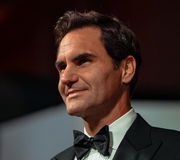
Imago
Credits-Instagram/Sebastian Calderon

Imago
Credits-Instagram/Sebastian Calderon
“Mental health isn’t its entity. It’s everyday life,” Noah Lyles was clear on his stance when it came to an athlete’s wellbeing. After winning gold in Paris, he revealed how one call with his therapist helped him through one of the toughest times of his life. And for him, it was one small choice, and it could change everything. Today, not only world-famous athletes like Lyles are advocating for men’s mental health, but even young high school track and field athletes are among the voices that are striving to be heard. One such high school track and field star, Sebastian Calderon, has now stepped forward to amplify this…
Watch What’s Trending Now!
In a long and elaborate note, the high school track and field star decided to pour out his emotions regarding his mental health. Taking to Instagram, the young sprinter shared a carousel of pictures with his life story written on them. The caption read, “It’s Bigger than Track. Men’s Mental Health Edition. Sebastian Calderon is a multi-time NCHSAA 2A State Champion. But there’s more to the story than what you see from the outside. Read through some of these quotes from Seaforth Star, Sebastian Calderon, to learn about the struggles he has faced in his personal life beyond track.”
“It’s Bigger than Track” series is inspired by some of the setbacks and struggles that he had to face as a high school sprinter. His goal through this was to emphasize that every athlete is a human first and faces struggles with mental health, injuries, or illness, but continues to excel in their sport. He also provided a form to all athletes who could be nominated to post their story in the next edition. The 4X state champs’ own life story was etched in the pictures. He first started the post by giving statistics of mental health struggles that men in the USA have to go through.“Especially for men; in the U.S., nearly 100 men die by suicide each day, making up 79% of all suicide deaths,” he wrote.
ADVERTISEMENT
Next, the young sprinter started out his story where he had moved to North Carolina, which was the first reason for him feeling anxious. “Initially, my freshman year was amazing; I made friends and discovered a love for track.” However, things did not take much time to become bitter. He continued, “But when my parents announced their divorce during my sophomore year, everything changed. I became isolated, pretending to be fine while pushing my feelings deep down.”
This is when his struggle with depression began, and he catapulted into his training, believing that it could heal him. Despite having a turbulent time mentally, he became a two-time state champion in the 500m. However, his health has started to take a toll on him. Calderon was at the edge of something devastating. He was about to do something irreversible. However, at that time, he reached out to his teammates and found unwavering support.
“I got professional help and found solace in therapy, learning that I wasn’t alone and that life is worth living. If it wasn’t for track and the relationships | built with it, I would not be here today to share this story,” the 5th image said. And now he’s aiming for more after winning four state championships and regaining his hope. Let’s see some of the other world-famous track and field athletes who spoke about mental health. They encouraged many to advocate for their mental health fearlessly.
ADVERTISEMENT
Sebastian Calderon is not the only one
10 months ago, Lyles posted this on X: “I have Asthma, allergies, dyslexia, ADD, anxiety, and Depression. But I will tell you that what you have does not define what you can become. Why Not You?” Additionally, he shared this post after winning the men’s 100m final at the Paris Olympics. His grit and determination overpower the darkness that takes over his mind sometimes. But he was brave enough to not only fight them but also speak about them publicly. Just a couple of days before he was going to run the 200m at to 2024 Paris Olympics, Lyles got the dreadful news. He tested positive for COVID-19. Tests. Quarantine. Asthma. Mental health struggles. Everything hit him like a truck. But what did he do? Sprinted through them all. As he sprinted around the half-lap distance in the Stade de France, Lyles somehow found the energy to finish.
ADVERTISEMENT
Even though he did not win gold, he won a bigger fight and still managed to achieve a bronze medal before collapsing on the track and being taken away in a wheelchair. “This may be my favourite medal that I have so far,” Lyles shared on olympics.com, 15th August 2024 issue. “I’ve never been in such a hard battle.” He said, as per Olympics.com.
Even the greatest sprinter in history, holding world records in the 100m, 200m, and 4x100m relay, did not shy away from speaking about mental health struggles. Usain Bolt also opened up about this. Speaking to Yahoo Sports’ The Unwind back in October 2021. “If you’re going through stuff, you should take time [for yourself],” he said of his approach to mental health. “You always want to do more, to go further, but at the end of the day, if you don’t take care of yourself, then what’s going to happen?”
Top Stories
Sean Payton Announces Retirement Plans as Broncos HC Demands Improvement From Bo Nix & Co. Before Playoffs

Greg Biffle’s $4M Worth Prized Possession Still Without a Buyer Leaves NASCAR Fans Heartbroken

LIV Golf Braces for Another Possible Exit in Wake of Brooks Koepka Departure

Biff Poggi All But Confirms Bryce Underwood’s Michigan Future After Announcing His Own Departure

Roger Federer Draws Criticism from Swiss Government Chief for Tourism Boom in Country

NASCAR World Mourns as Former Watkins Glen President Michael Printup Passes Away at 60

From budding athletes to world-renowned stars, everyone is stepping up for mental health. Calderon’s story is just one reminder that no one has to go through it alone.
ADVERTISEMENT
ADVERTISEMENT
ADVERTISEMENT
ADVERTISEMENT

